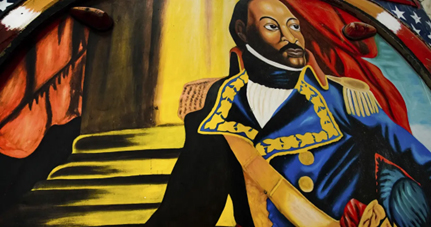By Don Valentine
Schools in America don’t teach the history of the only successful Black slave rebellion in the Western Hemisphere. The audacious leadership of a former slave Toussaint L’ouverture wove the path to create Haiti. It was a masterful real life chess match with France, Spain, England and America. The History Channel wrote, “Saint-Domingue in the late 18th century thrived as the wealthiest colony in the Americas…” Black Past noted, “In the 18th century, Saint Domingue, as Haiti was then known, had become France’s wealthiest overseas colony, generating more revenue for France than all 13 North American colonies for Great Britain.”
The crafty General L’ouverture was not an illiterate slave. Biography.com recorded, “Toussaint was fortunate to be owned by enlightened masters who allowed him to learn to read and write. He read the classics and the Enlightenment political philosophers, who deeply influenced him.”
Many of the rebels were inspired to take action by the success of the French Revolution in 1789. During that revolution the seminal issuance of the Declaration of Rights of Man passed in France in August 1789. It stated, “In the eyes of the law all citizens are equal.” That document became a rallying banner for General L’ouverture soldiers.
After the revolution, France was the pariah of the European powers because they left a monarchy to become a republic. England and Spain forecast that as a viable threat for their monarchies. The History Channel annotated, “…Saint-Domingue’s sustained slave rebellion had put France’s wealthiest colony in the Americas at risk of falling under the control of its enemies, England and Spain.” Toussaint was aware of his regiment’s lack of training, but he was also aware of France’s desperate position in the face of Spanish and British hostility. So when it suited his needs, he joined forces with France’s enemies.” General L’ouverture skillfully played the global chess board. “…he made an alliance with neighboring Santo Domingo, taking command of a Spanish auxiliary force to reclaim a swath of Saint-Domingue territory. He refused to negotiate with French commissioners until 1794, when France formally abolished slavery in its territories. Toussaint then rejoined the French forces, beat back the Spanish and began his sustained campaign against the British, who had their own designs on Saint-Domingue. His army ousted British forces in 1798, causing them to lose more than 15,000 men and 10 million pounds in the process. Nonetheless, Toussaint continued to dangle the prospect of British influence in Saint-Domingue as a check against French complacency and to spur trade with Britain’s neighboring colony of Jamaica. Toussaint entered into a secret agreement with the British army that eased their naval blockade of imported goods. He went a step further in 1799, opening diplomatic talks with the Americans to renew commercial ties that would benefit both economies—a major coup for Toussaint. In just two years, American exports to the colony rose more than 260 percent…” Sak Pase, “Lost Black History!”


